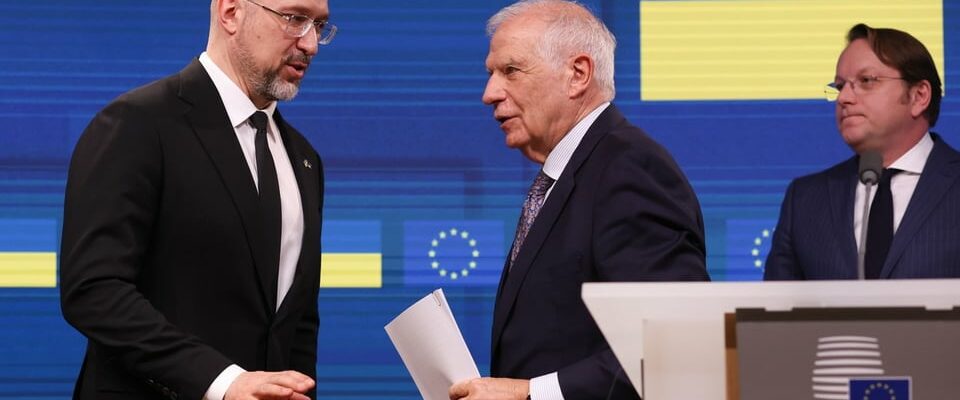Contents
Will interest from Russian central bank billions soon flow to Ukraine? The EU states have the final say.
It is becoming increasingly difficult to raise the necessary international money for military support for Ukraine in the war against the aggressor Russia. Willingness is dwindling in various EU countries, as well as in the USA.
Reach for interest rates
The EU Commission now wants to go ahead and give Ukraine up to three billion euros annually from the proceeds of frozen assets of the Russian Central Bank. The Brussels authority suggests that 90 percent of this should be transferred via the European Peace Facility.
Legend:
EU Foreign Affairs Representative Josep Borrel (M) with Ukrainian Prime Minister Denys Schmyhal (L) at a media conference on March 20, 2024 in Brussels.
Keystone/EPA/OLIVIER HOSLET
The rest of the interest income should flow into the central EU budget, as EU foreign policy chief Josep Borrell explained. The initiative still needs to be approved by the member states. The meeting of EU heads of state and government will take place on Thursday and Friday.
The exact amount should be based on global interest rates. In the 27 EU states, a total of 210 billion euros in investments from the Russian central bank are on hold. About 70 percent of it is at the private Belgian custodian bank Euroclear, where securities and cash from the Russian central bank worth 190 billion euros are stored.
This is how the collection of funds works
In total, up to four and a half billion euros could flow to Ukraine, as SRF Brussels correspondent Charles Liebherr explains. Because Euroclear also has to pay taxes on the dividends. Belgium, as Euroclar’s place of business, has already decided to pass on these profit taxes directly to Ukraine.
Since February, Euroclear has had to transfer profits from the assets of the Russian Central Bank to a special account and is not allowed to pay them out. The funds will now be subject to a tax of 97 percent. The dividends flow into the U-budget and from there into a special fund for Ukraine’s military rearmament. The fund already exists and has been financing deliveries of ammunition and weapons to Ukraine since the beginning of the war.
The proposal is legally watertight
The experts at the EU Commission consider the Commission’s proposal to be very watertight, but admit that everything is a legal novelty: the assets of the Russian central bank will not be touched; only the dividends that legally belong to the custodian bank Euroclear will be deducted.
In the eyes of lawyers, the Russian state has no legal means whatsoever, for example to assert a claim to the funds in a European court. But that doesn’t rule out the possibility that the Russian central bank will try.
New law is likely to come – even without Hungary
According to Liebherr, the move for the new law is practically undisputed among the EU states: all states except Hungary have already promised their approval. When it comes to disbursements from the EU fund for Ukraine’s rearmament, unanimity applies, and Hungary has regularly vetoed it in recent months.
According to Liebherr, this cannot prevent the delivery of weapons by individual EU states, but can only delay the financial reimbursement from the EU budget. Accordingly, the proposed solution is not ideal. But the EU still chooses this more complicated path – to get Hungary to give in and to demonstrate unity towards Russia.
